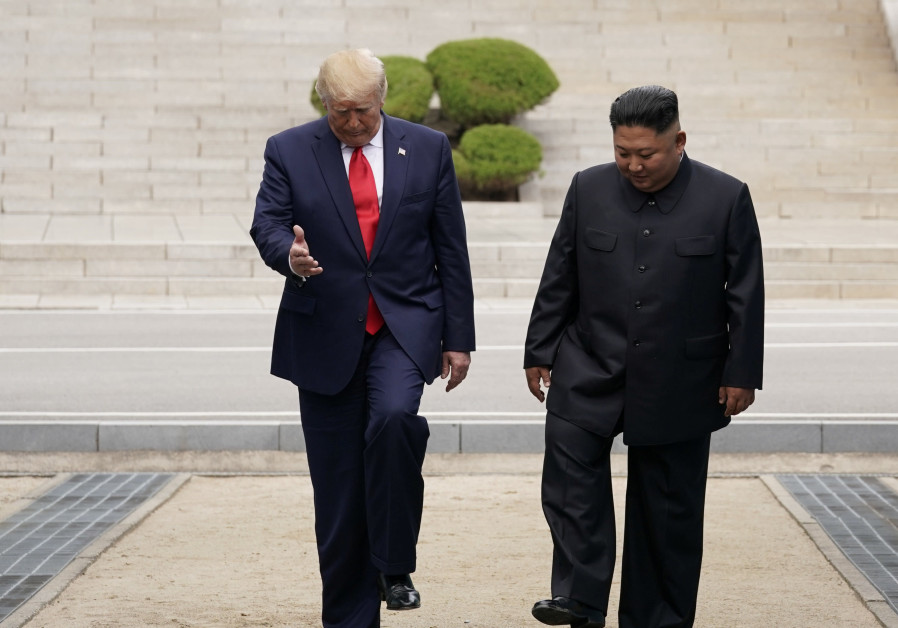The launches followed repeated short-range missile tests by North Korea since its leader Kim Jong Un agreed in a June 30 meeting with U.S. President Donald Trump to reopen working-level talks

North Korea said on Monday it was willing to restart nuclear talks with the United States in late September but warned that dealings between the sides could end unless Washington takes a fresh approach.
Within hours of the announcement, North Korea fired two unidentified projectiles east from its South Pyongan province, South Korea’s Joint Chiefs of Staff said.
The launches followed repeated short-range missile tests by North Korea since its leader Kim Jong Un agreed in a June 30 meeting with U.S. President Donald Trump to reopen working-level talks stalled since their failed February summit in Hanoi. The talks have yet to resume despite repeated U.S. appeals.
A senior Trump administration official said later: “We are aware of reports of projectiles launched from North Korea. We are continuing to monitor the situation and consulting closely with our allies in the region.”
North Korean Vice Foreign Minister Choe Son Hui said in a statement carried by the North’s official KCNA news agency Pyongyang was willing to have comprehensive discussions with the United States in late September “of the issues we have so far taken up” at a time and place agreed between both sides.
Trump was asked about the offer while speaking to reporters at the White House and called it “interesting.” He also mentioned, as he often does, his “good relationship” with Kim.
“I just saw it as I’m coming out here, that they would like to meet. We’ll see what happens,” Trump said. “I always say having meetings is a good thing, not a bad thing.”
Asked for comment on the North Korea statement, a U.S. State Department spokeswoman said: “We don’t have any meetings to announce at this time.”
U.S. Secretary of State Mike Pompeo said on Sunday he hoped for a return to denuclearisation talks in the coming days or weeks, while reiterating the U.S. objective of North Korea’s complete denuclearisation and saying Washington was disappointed by North Korean short-range missile tests.
Trump has sought to play down such short-range tests, saying they do not violate a North Korean freeze in nuclear and long-range missile tests in place since 2017. He emphasized this freeze again when he spoke on Monday, before the latest launches.
‘ENOUGH TIME’
In her statement, Choe referred to a statement by Kim in April in which he set a year-end deadline for the United States to show more flexibility in talks. Those talks broke down in February over U.S. demands for North Korea to give up all of its nuclear weapons and Pyongyang’s demands for relief from punishing U.S.-led international sanctions.
“I think the U.S. has since had enough time to find the calculation method that it can share with us,” she said in an English-language version of her remarks carried by North Korea’s official media.
“I believe that the U.S. side will come out with a proposal geared to the interests of the DPRK and the U.S. and based on the calculation method acceptable to us,” she said, using the acronym for North Korea’s official name, the Democratic People’s Republic of Korea.
“If the U.S. side fingers again the worn-out scenario which has nothing to do with the new calculation method at the DPRK-U.S. working negotiation to be held with so much effort, the DPRK-U.S. dealings may come to an end,” Choe said.
The end-of-September time frame would coincide with the annual United Nations General Assembly in New York, which Pompeo is due to attend. North Korea’s mission to the United Nations said last week Foreign Minister Ri Yong Ho would not attend “due to his schedule.”
North Korea has demanded that Pompeo be replaced with a “more mature” person in the U.S. negotiating team, while lauding the rapport built between Kim and Trump in three meetings since June 2018.
The U.S. special representative for North Korea, Stephen Biegun, led working-level talks with North Korea in the run-up to the failed Hanoi meeting.
Biegun said in a speech at the University of Michigan on Friday Washington’s aim was to transform relations with Pyongyang and establish a permanent peace on the Korean peninsula, but stressed that this would require the elimination of weapons of mass destruction.
Embarking on an “intensive set of negotiations” is necessary, Biegun said, adding that “the diplomatic opening is fragile” and expressing concern about North Korea’s continuing weapons development.
There were immediate actions the United States could take if negotiations made progress, Biegun said without elaborating.
The steps Washington has so far offered North Korea publicly have fallen far short of Pyongyang’s expectations.
Before the Hanoi summit, U.S. officials raised the possibility that, while sanctions would remain, Washington might be willing to take interim steps such as boosting humanitarian aid or opening liaison offices.
As reported by The Jerusalem Post
